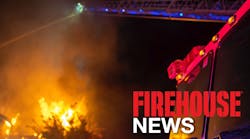Nov. 15--The Pullman Fire Department has gotten used to "making it work" with less than ideal levels of staffing because of budget constraints in recent lean years.
Now local union representatives for the Pullman Fire Department, along with management, are asking city officials to consider raising their staffing levels.
But with the recent passing of levy lifts on property taxes, including one designated specifically for emergency medical services, some members of the local firefighters union are wondering why city officials are only aiming for staffing levels equivalent to those set during the Great Recession.
"Voters have given the city the pretty clear message, at least as far as I understand it, that they'd like to increase EMS services," said local firefighter union president Andrew Chiavaras.
While city and university populations are both growing and new building permits hit an all-time high, Chiavaras said, staffing levels for the fire department, which already pulls double duty for fire and medical response, have remained fairly stagnant.
As the city grows, he said, public safety sectors need to grow with it.
Since voters passed the levies, city officials have OK'd filling two vacant positions, one additional firefighter and one training officer, in the department, but Chiavaras said he doesn't think it's enough.
"Pullman is rather unique in that we'll get multiple calls in a row. Over half the time when we're out on a call, we'll get another one before we get back to the station," he said.
That, he said, combined with state and local regulations requiring a minimum numbers of firefighters at stations, on engines and to make rescues or fight fires within a structure, easily spreads the staff too thin.
They're sentiments that Fire Chief Mike Heston agrees with.
While he admits they've always had bodies to send to a call, with other agencies such as District 12 and the Moscow Fire Department, to call on when Pullman firefighters are unavailable, he said the possibility is certainly there.
Between 75 and 80 percent of the calls that come in are for medical emergencies, Heston said, and a quarter of those are typically defined as "serious," which could range simply from someone unconscious because of too much drinking to a cardiac arrest.
For serious calls, the fire department tries to respond with at least six people, Heston said, because it takes four to carry a stretcher, and if any CPR or additional medical attention is required while a patient is being moved, they'll need more than that.
Until someone arrives on the scene to determine the level of response needed, they have to be prepared for the worst, Heston said.
While city officials admit the city is looking at an influx of cash with the passage of the levies and the record number of building permits, it is the first such year after several lean ones.
"The future looks good, but we're just at the beginning stages of getting better -- there's no trend set there yet for maintaining and sustaining," said City Supervisor Mark Workman. "I think we'll get there, but we've got to prove it."
Earlier this year when the city asked voters to pass the levies, there was never any promise to increase staffing levels for fire and police, Workman said, but simply to "restore" staffing levels to their previous state, eliminating vacancies in those departments, as well as others, that had been maintained to keep department budgets low.
With the new money, departments are beginning the process of restoring those staffing levels, but the No. 1 priority for city officials now is restoring cash reserves, which were dipped into to balance previous budgets.
A minimum goal of 13 percent cash reserves was set by council some years ago, Workman said. The city is currently projected to start 2014 with 10.6 percent.
Typically, he said, they prefer to have that percentage up in the mid-20s, and have set 22.65 percent as the goal to carry into 2015.
While Workman said he thinks increasing staffing for the fire department is important, he doesn't believe the city should be the only one footing the bill.
"I don't disagree with the need for more staffing, but I think that the funding for it needs to come from somewhere else, either the university or grants," he said. "I don't think the city can sustain any more funding for departments."
The city is in the beginning stages of renegotiation with Washington State University for reimbursement to the fire department for its services.
Currently about 20 percent of the city's calls are to the campus, Heston said, but not all the university's students live there.
"Another 40 percent of our call volume comes from the fraternities, sororities and student apartments on College Hill," he said.
The university, however, only pays the fire department for calls to campus, and nothing extra for the off-campus calls to students living and partying on College Hill.
"So we're looking for more financial support than what we're getting at the moment and gathering facts to look at that," Heston said. "Right now, based on call volume at least, WSU is getting a real bargain in terms of what they're getting from us."
Bill McKee can be reached at (208) 883-4627, or by email to [email protected].
Copyright 2013 - Moscow-Pullman Daily News, Moscow, Idaho





